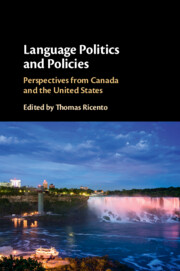Book contents
- Language Politics and Policies
- Language Politics and Policies
- Copyright page
- Dedication
- Contents
- Figures
- Tables
- Contributors
- Preface
- Contributor Personal Statements
- Introduction
- Part I Theoretical Orientations
- Part II The United States Context
- 5 Disciplining Bilingual Education
- 6 Measured Multilingualism
- 7 The Rise, Fall, and Rebirth of Bilingual Education in California and the Ongoing American Dilemma
- 8 Language Policy Conflicts
- 9 Indigenous Language Movements in a Settler State
- 10 The Politics of Language Education Policy Development and Implementation
- Part III The Canadian Context
- Index
- References
10 - The Politics of Language Education Policy Development and Implementation
Minnesota (Not So) Nice?
from Part II - The United States Context
Published online by Cambridge University Press: 18 July 2019
- Language Politics and Policies
- Language Politics and Policies
- Copyright page
- Dedication
- Contents
- Figures
- Tables
- Contributors
- Preface
- Contributor Personal Statements
- Introduction
- Part I Theoretical Orientations
- Part II The United States Context
- 5 Disciplining Bilingual Education
- 6 Measured Multilingualism
- 7 The Rise, Fall, and Rebirth of Bilingual Education in California and the Ongoing American Dilemma
- 8 Language Policy Conflicts
- 9 Indigenous Language Movements in a Settler State
- 10 The Politics of Language Education Policy Development and Implementation
- Part III The Canadian Context
- Index
- References
Summary
Minnesota has a decades-long history of welcoming and resettling refugees, but there exists a longstanding gap in programming for minority language students and an absence of instruction to develop and build upon students’ native languages. To address these educational inequities, the 2014 Learning English for Academic Proficiency and Success (LEAPS) Act was written and passed in the Minnesota state legislature. This sweeping state law revises many statutes to draw greater attention to English learner education, including recommendations for increased support for native languages. Drawing on interviews with key policy officials, close analysis of the text of the law, we examine the development and implementation of the law. We demonstrate how local culture, in particular what has been termed ‘Minnesota Nice,’ has shaped both the law’s development and implementation path. This chapter demonstrates the utility of narrative analysis in yielding insights into how language policies are developed, interpreted, and prioritized.
Keywords
- Type
- Chapter
- Information
- Language Politics and PoliciesPerspectives from Canada and the United States, pp. 192 - 210Publisher: Cambridge University PressPrint publication year: 2019
References
- 2
- Cited by



